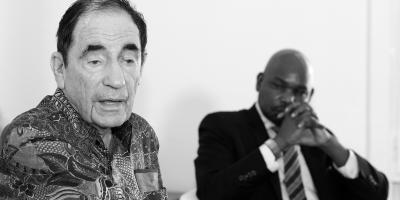
In an address to IDLO staff in Rome, Albie Sachs, formerly of the Constitutional Court of South Africa, shared memories from a lifetime spent defending freedom – first as an exiled member of the African National Congress (ANC), and then as a respected jurist, holding the post-apartheid state accountable to its citizens.
Now eighty years old, Justice Sachs (also a member of IDLO’s International Advisory Council) spoke of adjudicating on matters of access to health – including in harrowing, life-or-death circumstances –, of helping secure treatment for people living with HIV, and of striking a balance between property rights and the right to housing in a society that remains polarized between haves and have-nots.
Following his address, Justice Sachs spoke to IDLO News editor Andre Vornic.
AV: One thing you didn’t mention was the bomb attack on your car by the South African police, in 1980s Mozambique. You wrote later that you wished the ‘soft vengeance on the rule of law’ on the man who blew you up. Can you elaborate on that?
AS: I’m lying in a hospital bed in London, recovering. I’ve lost my arm, the sight in one eye, and I’m feeling fantastic: I survived! That moment every freedom fighter’s waiting for… Will they come for me today? Tomorrow? If they come, will I be brave? Will I get through? Well, they came for me and here I was. So one day I’m lying in my bed and I get a note. “Don’t worry, comrade,” it says, ‘we will avenge you.” Avenge me? Are we going to cut off one arm? Blind someone in one eye? Where will that get us? But if we get freedom, democracy, the rule of law, that would be my soft vengeance. I even remember saying to myself, “If we get democracy and the rule of law, roses and lilies will grow out of my arm." By achieving our aims, we validated idealism, we validated belief in constitution, rule of law, equal rights for all.
AV: So the rule of law cost you an arm and an eye…
AS: I wouldn’t put it like that. Many of the others lost more than an arm and an eye – they lost their lives before they saw freedom come. I had the joy of surviving and seeing the triumph of the ideals that held us together.
YOU HAVE TO FIND A MECHANISM WHERE THE COURTS CAN TELL THE GOVERNMENT WHAT IT CAN AND CANNOT DO
AV: But in your lecture, you hedged the notion of rule of law with a host of other concepts, like the ‘non-justiciability’ of certain rights. You spoke of the importance of ‘reasonableness’ as a criterion for granting them. Isn’t there a danger that this kind of talk makes the rule of law rather difficult to grasp, and hence to enforce?
AS: I don’t think ordinary people find it difficult to grasp. Because basically, what it means is justice – through law, through the Constitution, through the courts. Lawyers can make it difficult. But we had to make it sustainable: you can’t have a constitution that promises housing, education, health, and then you switch on the light, and it’s all suddenly there. You have to find a mechanism where the courts can intervene and to some extent, tell the government what to do and what not to do. So we used the notion of reasonableness as a measuring rod. In the case of refusing access to antiretroviral drugs for people living with HIV, we said that was unreasonable. And as a consequence, South Africa now has the largest such program in the world.
THE RULE OF LAW IS AN AGENCY THAT LIMITS THE POWER OF THE CORRUPT
AV: You also said that freedom from corruption is essential to exercising every other right. Perhaps that’s where all rule of law efforts should start…
AS: I don’t think there is a single country in the world where people don’t use positions of authority to enrich themselves in ways that are quite unlawful. The degree varies from country to country, but the effect is most spectacularly bad in poor and developing countries, where the resources should be used to bring about social development. That’s why the rule of law, as an agency that limits the power of the corrupt, that ensures investigation of corruption, that ensures that the judiciary will not itself be corrupted, plays a very important role.
AV: IDLO is trying to enshrine the rule of law as central to sustainable development. Do you think that’s’ a fair understanding of the rule of law, or do you think that’s stretching the concept?
AS: On the contrary, I think that’s fundamental. It ensures that sustainable development itself takes place in a sustainable way – that is, a principled way, a way that’s according to a philosophy of fairness, of justice, of participation, of transparency, of openness. These are all elements of the rule of law – it’s not just rules that those people with good lawyers and good money enforce by way of the courts. It’s a way of life for a society, and it's essential to sustainable development.
Watch a clip of the interview here

